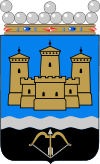Savonlinna
| Savonlinna Nyslott | ||
|---|---|---|
| Municipality | ||
| Savonlinnan kaupunki | ||
 The passenger harbor of Savonlinna | ||
| ||
 Location of Savonlinna in Finland | ||
| Coordinates: 61°52′05″N 028°53′10″E / 61.86806°N 28.88611°ECoordinates: 61°52′05″N 028°53′10″E / 61.86806°N 28.88611°E | ||
| Country |
| |
| Region | Southern Savonia | |
| Sub-region | Savonlinna sub-region | |
| Charter | 1639 | |
| Government | ||
| • Town manager | Janne Laine | |
| Area (2018-01-01)[1] | ||
| • Total | 3,597.70 km2 (1,389.08 sq mi) | |
| • Land | 1,210.51 km2 (467.38 sq mi) | |
| • Water | 762.62 km2 (294.45 sq mi) | |
| Area rank | 27th largest in Finland | |
| Population (2018-08-31)[2] | ||
| • Total | 33,866 | |
| • Rank | 31st largest in Finland | |
| • Density | 27.98/km2 (72.5/sq mi) | |
| Population by native language[3] | ||
| • Finnish | 97.7% (official) | |
| • Swedish | 0.1% | |
| • Others | 2.2% | |
| Population by age[4] | ||
| • 0 to 14 | 13.7% | |
| • 15 to 64 | 64.5% | |
| • 65 or older | 21.8% | |
| Time zone | UTC+2 (EET) | |
| • Summer (DST) | UTC+3 (EEST) | |
| Municipal tax rate[5] | 20.5% | |
| Website | www.savonlinna.fi | |
Savonlinna (Swedish: Nyslott) is a town and a municipality of 33,866 (31 August 2018)[2] inhabitants in the southeast of Finland, in the heart of the Saimaa lake region. The Finnish name of the town means "Castle of Savonia" and the Swedish name means "New Castle".
History
The city was founded in 1639, based on Olavinlinna castle. The castle was founded by Erik Axelsson Tott in 1475 in an effort to protect Savonia and to control the unstable border between the Kingdom of Sweden and its Russian adversary. During the Russo-Swedish War (1741–1743), the castle was captured by Field-Marshal Peter Lacy. It was held by Russia between 1743 and 1812, when it was granted back to Finland as a part of the "Old Finland".
In 1973 the municipality of Sääminki was consolidated with Savonlinna. In the beginning of year 2009 the municipality of Savonranta and a 31.24 km2 (12.06 sq mi) land strip from Enonkoski between Savonlinna and Savonranta were consolidated with Savonlinna.
Transport
This town is 335 kilometres (208 mi) away from the capital of Helsinki by road, some four hours away by train. There is an airport in the town, and the journey to Helsinki takes 40–60 minutes by plane. It is built on a chain of islands located throughout a number of large lakes.
Education
The University of Eastern Finland has a campus in Savonlinna, primarily for teacher education.
Attractions
The city hosts the famous annual Savonlinna Opera Festival. The operas are performed on a stage built inside the castle. It also has hosted the Mobile Phone Throwing World Championships annually since 2000.
Sports
The ice hockey team of Savonlinna, SaPKo or Savonlinnan Pallokerho, is playing in the second tier Mestis. Notable ice hockey players and coaches from Savonlinna include Tuukka Rask (Stanley Cup and Vezina Trophy winner), Hannu Aravirta, Jarmo Myllys, Ville Leino, and Joonas Rask.
The top-tier volleyball team Saimaa Volley plays some of its home matches in Savonlinna. The football team Savonlinnan Työväen Palloseura (STPS), is playing in Kolmonen, the fourth tier.
International relations
Twin towns — Sister cities
References
- ↑ "Area of Finnish Municipalities 1.1.2018" (PDF). National Land Survey of Finland. Retrieved 30 January 2018.
- 1 2 "Ennakkoväkiluku kuukausittain sukupuolen mukaan alueittain, elokuu 2018" (in Finnish). Statistics Finland. Retrieved 21 October 2018.
- ↑ "Population according to language and the number of foreigners and land area km2 by area as of 31 December 2008". Statistics Finland's PX-Web databases. Statistics Finland. Retrieved 29 March 2009.
- ↑ "Population according to age and gender by area as of 31 December 2008". Statistics Finland's PX-Web databases. Statistics Finland. Retrieved 28 April 2009.
- ↑ "List of municipal and parish tax rates in 2011". Tax Administration of Finland. 29 November 2010. Retrieved 13 March 2011.
- ↑ "Savonlinnan ystävyyskaupungit". savonlinna.fi. Retrieved 26 April 2014.
External links
![]()
- Town of Savonlinna – Official site
- Visit Savonlinna official tourism site

- World66 – Open source travel guide
- Map of Savonlinna

Image gallery

 Olavinlinna castle seen from the railway bridge.
Olavinlinna castle seen from the railway bridge.- The Salama boat moored in port of Savonlinna Provincial Museum.
 Rauhalinna villa is located in Lehtiniemi
Rauhalinna villa is located in Lehtiniemi Kerimäki Church is the biggest wooden church in the world.
Kerimäki Church is the biggest wooden church in the world.- Savonlinna Provincial Museum
 Lusto is a national forest museum is located in Punkaharju
Lusto is a national forest museum is located in Punkaharju Boat houses in Kerimäki
Boat houses in Kerimäki

